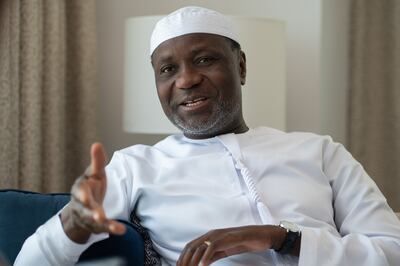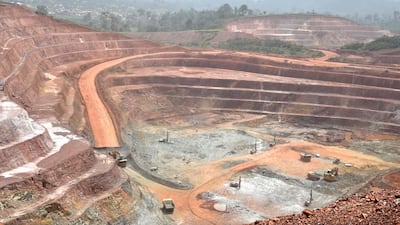The Ivory Coast has called for stricter regulations on West African gold exports, similar to the diamond industry's Kimberley Process, to combat the illegal trade of the yellow metal.
West Africa is the largest contributor to Africa's gold production, with mining of the metal surging in recent years to eclipse Southern Africa's traditional producers.
However, a large chunk of the revenue of West African nations is lost to illicit trade every year, with gold from illegal mines being smuggled to major consumer markets in the Middle East and Asia.
For Ivory Coast, the world’s largest cocoa producer, developing the mining sector is crucial to efforts to diversify its economy, which is heavily reliant on agriculture.
"With the Kimberley agreement, any country can buy diamonds, [and] we will ensure that the value chain is clean," Mines and Energy Minister Mamadou Coulibaly told The National in an interview recently.
"So, if we can have this transparency with countries that are buying gold coming from West Africa, I think [gold smuggling] will be over within a matter of a month.
"But, at the end of the day, we need to talk to those who are the final consumers of the gold."

The Kimberley Process is an international system established in 2003 to make the diamond supply chain more transparent and prevent the trade of conflict gems sold by rebel militias or terrorist groups to finance conflicts.
Between 321 and 474 tonnes of artisanal gold is produced in Africa without being declared, which equates to about $24 billion to $35 billion, according to non-profit SwissAid.
At least 435 tonnes of gold were smuggled from the African continent in 2022, the organisation said in a report earlier this year.
The Ivory Coast aims to engage directly with companies purchasing this gold to form partnerships, encouraging them to set up refineries in the country.
This would allow for better control over the entire value chain of the precious metal, Mr Coulibaly said.
“We need to talk directly with these companies to find a way how we can do it properly because when people are smuggling gold, there’s going to be a lot of trouble and security issues,” Mr Coulibaly said.
“We have trouble in our region … terrorists are using these natural resources to finance war … so it’s very tricky.”
West Africa has struggled with the rise of several terrorist groups in recent years, including Jama’at Nusrat Al Islam wal Muslimin (Jnim), a group affiliated with Al Qaeda.
A complete halt to the illegal movement of gold from the Ivory Coast would provide a significant boost to government revenue.
About three times the Ivory Coast’s current gold production of 56 metric tonnes is being smuggled abroad, Mr Coulibaly said, citing a recent government study. “This means that we will triple our revenue.”
The African country exported gold worth $2.1 billion in 2022, making the metal its second-largest export behind cocoa beans at $3.3 billion, according to the Observatory of Economic Complexity.
"African states need to take steps to formalise artisanal and small-scale mining and reinforce border controls as the gold leaks are a very large part of the problem," said Andrea Zanon, chief executive of start-up investor WeEmpower Capital.
"Non-African states should also ramp up their regulations to publish the identity of the countries of origin and the countries of dispatch of imported gold, and to work with authorities to identify unethical, environmentally unscrupulous and illegal trade."
Mr Zanon said that any push towards more stringent trade controls should start at the production level with the introduction of sustainable practices.
"International financial institutions (IFIs) can expand their role in gold production to provide financial incentives and environmental best practice to push the sector towards more transparency and clean tech-savvy solutions," he said.
"Everybody wins if the international community comes together to support West African countries to formalise the sector's rules, building checks and balances."
In 2022, the London Bullion Market Association (LBMA) and the World Gold Council (WGC) announced the launch of the Gold Bar Integrity programme, which seeks to digitally monitor the movement of gold from mine to market.
The organisations launched a pilot project that would involve the use of blockchain technology to establish an "immutable" record of a gold bar's origin and history of ownership.
“The programme is ambitious and will take time to onboard all major players in the gold industry, but there has been notable progress," said Andrew Naylor, head of Middle East and public policy at the WGC.
"Around the world, refiners, bullion banks and other members of the industry are exploring ways that distributed ledger technology and the GBI programme can be used in their businesses to contribute to a shared industry vision for enhanced transparency," Mr Naylor told The National.
“While the challenges associated with smuggling illegally mined gold remain, we believe the programme will, in time, help to create a more transparent and trusted gold supply chain.”

Record production
The Ivory Coast’s gold production reached a record high in 2023, thanks to the opening of new mines.
Last year, Canadian miner Montage Gold discovered the country's largest gold deposit at the Kone concession, about 470km north-west of the capital, Abidjan.
The mineral resources of the deposit are estimated at 155.5 tonnes of gold, while the mine is expected to have an ore processing capacity of 11 million tonnes annually, making it the third largest in West Africa.
The development of the mine will begin by the end of this year, with production scheduled to start in 2027, Mr Coulibaly said.
Gold is not the only valuable commodity to be found buried within the Ivory Coast’s soil.
Recent years have also revealed critical minerals such as lithium, manganese, nickel and even coltan, a valuable ore used in electronic devices.
However, the country is still in the exploratory phase and seeks to attract foreign investors into the space.
The Ivory Coast intends to carry out the initial phase of exploration to identify and assess mineral resources, Mr Coulibaly said.
Once it has confirmed the presence and location of these resources, the country will be in a stronger position to negotiate with private companies to get them involved in further exploration or development, he said.
Africa holds around 5 per cent of the world’s natural lithium ore reserves. Yet, only a few countries have substantial reserves of the metal. These include the Democratic Republic of the Congo, Ethiopia, Ghana, Mali, Zimbabwe and Namibia.
Oil and gas boost
The Ivory Coast is among a growing list of African states intensifying their focus on oil and gas exploration and production.
The country requires $15 billion to develop the Baleine and Calao offshore fields, which are crucial to its goal of achieving a more than threefold increase in its oil output by 2027, Mr Coulibaly said.
Production currently stands at about 60,000 barrels per day.
Both the fields are being developed by a consortium comprising state-owned Petroci and Italy’s Eni.
“We are very confident that the consortium can raise this money and develop [the projects] in time,” Mr Coulibaly said.
To join Opec, which represents about 27 per cent of global crude production, a country must be a net exporter of oil.
Following recent discoveries, Mr Coulibaly is optimistic that the West African country will become a net exporter within a few years, meeting this condition.
“Opec is a respected and well-known organisation. It will be our honour to be part of this organisation, but we haven't taken a decision yet,” he said. “It’s going to be a political decision.”
Resource curse risk
Mr Coulibaly emphasised the importance of learning from other countries' experiences in exploiting their natural resources, calling Botswana, in Southern Africa, a “success story”.
Botswana, considered one of the continent’s most stable countries, has used revenue from diamond exports to lift large segments of its population out of poverty, while investing in education and health care.
Mr Coulibaly said that Ivory Coast aims to avoid a fate similar to that of countries such as the DRC, which, despite being rich in minerals, is plagued by instability and corruption.
When it comes to oil and gas, Norway is the “best success story”, he said, highlighting the Scandinavian country’s shift from a major fossil fuel exporter to primarily using renewable energy.

